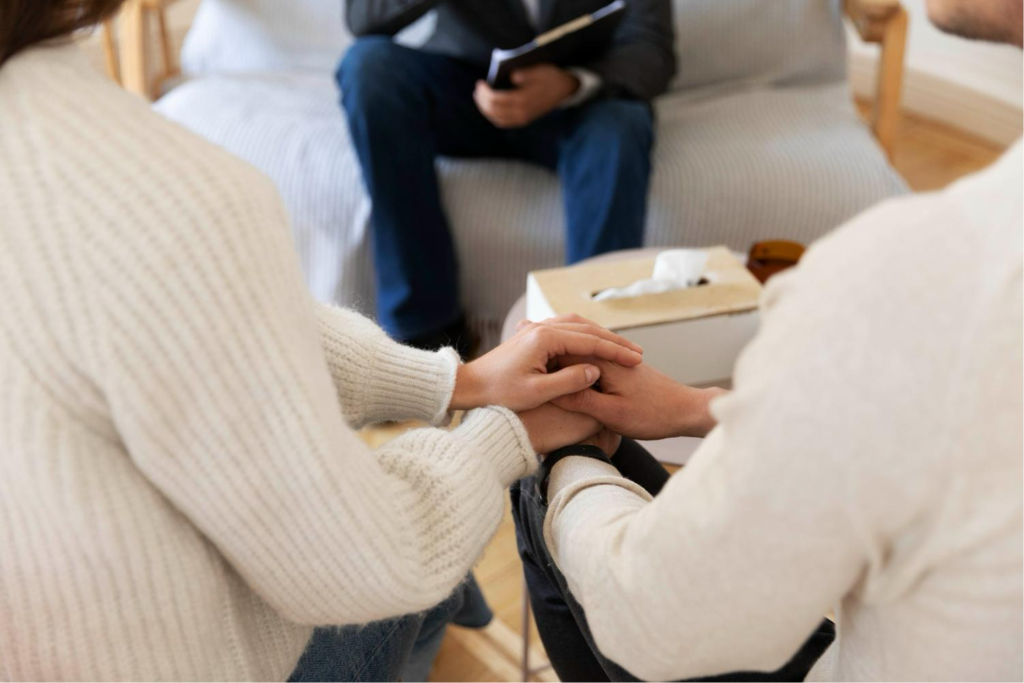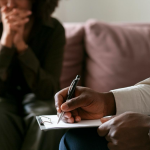Grief blindsides us. One moment, life runs its course; the next, a void opens where someone once stood. When that emptiness threatens to swallow you whole, bereavement counseling throws out a lifeline. Most people experience significant loss, yet many struggle through it alone, unaware that specialized support exists specifically for this universal human experience. Professional guidance through grief isn’t merely helpful – for many, it becomes essential to finding their way forward.
Understanding Bereavement and Grief
Bereavement refers to the state of having lost someone significant through death, while grief encompasses the emotional response to that loss. This distinction matters because while bereavement marks a factual status, grief manifests as a complex tapestry of reactions unique to each person.
Loss ripples through your entire system. Your body betrays you: sleep vanishes, appetite goes haywire, exhaustion clings like a second skin. Your emotions play demolition derby: fury crashes into numbness, then swerves into bone-deep sadness without warning signs. Your brain fogs over: keys go missing, decisions paralyze, concentration scatters to the wind.
Your grief “fingerprint” is utterly unique. Some people process loss openly; others retreat inward. Some experience grief in waves; others feel it as a constant weight. Your relationship with the deceased, cultural background, support network, and personal resilience all shape how you navigate this terrain.
The Role of Bereavement Counseling
Bereavement counseling creates a sanctuary where raw emotions find expression without judgment. Unlike conversations with well-meaning friends who might grow uncomfortable with prolonged grief, counselors remain steady witnesses to your pain, however it unfolds.
Professional support offers something casual conversations typically can’t – trained guidance through grief’s complexity. Counselors recognize when grief patterns suggest complications that might benefit from specific approaches. They help identify when physical symptoms cross into concerning territory or when emotional reactions intensify rather than gradually transform.
Acute grief – that initial period of intense pain – differs from prolonged grief, where healing seems suspended. Grief therapy addresses both phases with different strategies. Early sessions might focus on stabilization and processing shock, while later work explores adapting to a changed reality and reconstructing meaning.
Types of Bereavement Support Services
Individual Counseling
One-on-one sessions create a private refuge tailored exclusively to your grief landscape. This format allows for deep exploration of personal grief triggers, complicated relationship dynamics with the deceased, and private expressions of emotion that might feel inappropriate elsewhere. Individual counseling lets you voice thorny truths without censorship. Your counselor shifts approaches based on what you bring through the door each session, not some standardized grief protocol.
Group Therapy
Groups provide unexpected mirrors, reflecting aspects of grief you hadn’t recognized in yourself. Someone else’s story might unlock feelings you’ve bottled up or illuminate blind spots in your healing process. The collective wisdom often surpasses what any single counselor could offer.
Many find that group settings transform grief from a lonely burden into a powerful connector. Lifelong friendships often form through these shared journeys, creating support networks that extend far beyond the formal counseling period.
Family Counseling
Death reshapes family systems, sometimes leaving communication fractured when it’s most needed. Family grief support helps members navigate different grieving styles that often spark conflicts. One person needs to talk constantly; another retreats into work or hobbies. Children might seem fine one minute, then melt down over seemingly minor triggers.
Family counseling creates structured conversations when natural communication fractures under grief’s weight. It helps parents support children while managing their own pain and guides families through the practical challenges of changed roles, financial pressures, and decision-making in loss’s aftermath. The counselor helps navigate both the spoken and unspoken grief rules that emerge within family systems.
Specialized Programs
Children process grief through play and activity more than talk therapy. Teens often shut down with adults but open up with peers facing similar losses. Hospice bereavement counseling specializes in supporting families through anticipated deaths, addressing the complicated mix of relief, guilt, and sorrow that often accompanies long illness.
Other specialized programs target specific loss types: suicide survivors, bereaved parents, young widows/widowers, and those facing overdose deaths all benefit from targeted approaches. These programs recognize that certain losses carry unique challenges beyond general grief support.
Digital options have expanded access dramatically – virtual counseling, online support groups, and grief apps now reach people in rural areas or those physically unable to attend in-person sessions.

Benefits of Professional Grief Support
Grief therapy equips you with concrete strategies for managing overwhelming moments – from breathing techniques that calm the nervous system to meaningful rituals that honor your relationship with the deceased. These tools transform seemingly unmanageable pain into experiences you can navigate, even when they remain difficult.
The counseling space becomes one of the few places where all grief emotions – including socially uncomfortable ones like anger, relief, or questioning faith – can emerge without censorship. This freedom often accelerates healing that stalls when emotions remain suppressed.
Grief triggers panic when it defies our expectations. Professional guidance normalizes experiences that seem alarming: persistent dreams about the deceased, sensing their presence, or anniversary reactions that arise years later. Understanding these as common grief responses reduces anxiety about grieving “correctly.”
Professional support lays stepping stones toward a reconstructed life – not one that forgets or “moves on” from the deceased, but rather incorporates the loss into a new narrative. Counselors help you envision and create meaningful ways to maintain connections with those you’ve lost while still engaging fully with life.
Integrating Support: Combining Professional and Community Resources
While bereavement counseling provides essential structure and expertise, community connections offer ongoing sustenance. The most robust recovery often combines both approaches: professional guidance complemented by community understanding.
Beyond formal support groups, many find healing through educational workshops on grief, memorial events, or volunteer opportunities with others who share similar losses. These community connections extend support beyond weekly counseling sessions into everyday life.
Faith communities, neighborhood networks, and online forums often become vital sources of ongoing connection. A counselor can help you identify and activate these support systems, particularly when grief has drained the energy needed to reach out.
Addressing Common Misconceptions About Grief and Counseling
“Time heals all wounds” ranks as grief’s most toxic myth. Time passing doesn’t automatically heal grief – what you do within that time makes all the difference. Passively waiting for pain to fade often leads to grief going underground, not disappearing. Grief support provides structure for active healing rather than endless endurance.
Seeking help isn’t waving a white flag – it’s recognizing that grief’s complexity deserves specialized navigation tools. Just as you’d consult a physical therapist after breaking your leg, working with a grief specialist acknowledges that certain hurdles benefit from trained expertise.
Cultural messages about “staying strong” or keeping grief private often block people from resources that could genuinely help. Various cultural traditions offer valuable frameworks for processing loss, yet some inadvertently discourage expressing certain aspects of grief. Counseling creates space to examine these influences and determine which truly serve your healing.

Finding Your Path Forward
The journey through grief never follows a predictable timeline or path, but it doesn’t have to be traveled alone. Bereavement counseling offers companionship from guides who know the terrain’s hidden pitfalls and can point out landmarks of progress you might miss on your own. Reaching out for professional support often marks a turning point – not because grief magically resolves but because its burden gets distributed more evenly.
Healing doesn’t mean forgetting. It doesn’t require diminishing your love for the person who died. Instead, it means finding ways to carry that love forward while re-engaging with life. With appropriate grief therapy and support, many discover that grief eventually transforms from a breaking force into something that, surprisingly, reveals depths of resilience they never knew they possessed.
Lynn Martelli is an editor at Readability. She received her MFA in Creative Writing from Antioch University and has worked as an editor for over 10 years. Lynn has edited a wide variety of books, including fiction, non-fiction, memoirs, and more. In her free time, Lynn enjoys reading, writing, and spending time with her family and friends.















